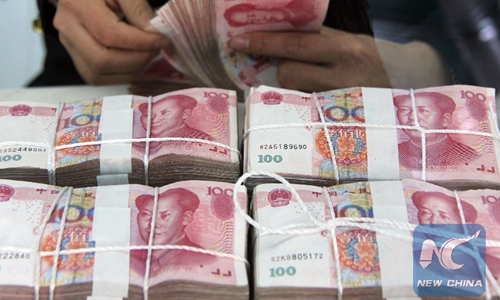Chinese economists in heated debate over fiscal deficit monetization
By Xie Jun Source:Global Times Published: 2020/5/18 21:48:40

File Photo: A worker counts Chinese currency renminbi banknotes at a bank in Tancheng County of Linyi City, east China's Shandong Province, April 11, 2013. Photo:Xinhua
There has been a heated debate among major Chinese economists and advisors recently over whether China should monetize the fiscal deficit, with some voting for the reform at a time when the economy is imperiled by the coronavirus, while others raised objections due to inflation and other risks.
Discussions over the topic heated up after Liu Shangxi, head of the Chinese Academy of Fiscal Sciences, recently suggested that the People's Bank of China (PBC), China's central bank, should directly purchase treasury bonds, or monetize the fiscal deficit, on a moderate scale.
According to Liu, this would help solve some of the problems brought by large-scale issuance of treasury bonds, including increasing the fiscal burden in the future and affecting loanable capital at domestic banks.
China's law currently bans the central bank from directly purchasing special treasury bonds, but Liu said that laws should advance with the times.
Lu Ting, an economist with Nomura, shared Liu's viewpoint that China should consider monetizing the fiscal deficit given that its economy is facing great downward pressure and a high unemployment rate under the shadow of the coronavirus.
But he stressed that it is only under such critical conditions that the measure should be rolled out, and that fiscal deficit monetization should never become a normalized operation.
China's economy suffered its first contraction in 28 years by shrinking 6.8 percent in the first quarter as the coronavirus epidemic dealt an unexpected blow to economic activity.
However, there were also many economists who objected to the proposal, citing the danger of fueling inflation and depreciation of the yuan.
"There's still a lot of leeway in China's monetary policy and many channels through which the PBC can pump liquidity into the markets. There's no need for China to imitate overseas quantitative easing (QE)," Wu Chaoming, chief economist at Chasing Securities, told the Global Times on Monday.
Currently, Venezuela is using fiscal deficit monetization, while QE adopted by the US central bank is also a form of fiscal deficit monetization, Wu said, adding that some countries, lacking policy space, have no choice but to resort to such methods.
According to Wu, one consequence brought by fiscal deficit monetization is inflation in asset prices. "The subprime crisis and the recent stock crash in the US already taught the world a lesson that governments shouldn't neglect asset prices in their policies," he said.
Hong Hao, chief economist at the China Financial Think Tank, also said that he was against the proposal as China shouldn't resort to expanding money issuance to prop up the economy.
"Local governments shouldn't be obsessed with the idea of directly pumping money into the markets, as what China's market is lacking nowadays is not capital but good, profitable projects," he said.
According to Hong, the government should design more policies to help domestic industries group together in clusters and carry out innovation, just like the Guangdong-Hong Kong-Macao Greater Bay Area. And when industrial competence is enhanced, market capital will voluntarily pour in.
"The epidemic might be an accelerator but not the ultimate reason behind some industries' decline. I think the government should allow such economic metabolism to happen," he said.
Posted in: ECONOMY